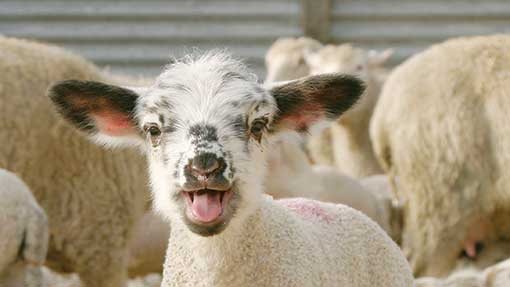Ask the Vet: Watery mouth in lambs

Lesley Bingham, farm vet at Westpoint Vets in the South West gives advice on dealing with watery mouth in lambs.
Q Each year I end up with a few lambs going down with wet mouth. The lambing area is disinfected with lime between uses.
I also make sure lambs drink ASAP, but no matter what I do, some still go down with it. I want to prevent as many losses as possible through use of a vaccine and was wondering what is best?
A Watery mouth is caused by an overgrowth of E coli bacteria in a lamb’s gut. The bacteria is everywhere in the environment, but concentrated in faeces and therefore the environment and faeces-spoilt fleeces can be a source of contamination.
Lambs are born with no natural protection against this problem.
As soon as a newborn lamb drinks colostrum the pH in the lamb’s stomach is reduced. The bacteria cannot survive these acidic conditions and will be killed.
However, if intake of colostrum is delayed for any reason, the bacteria will very quickly move through the stomach and populate the small intestine.
This leads to gut stasis causing the common signs of retained meconium (first poo) and inability to swallow, causing the watery mouth.
There is usually gas trapped in the intestines as well. Lambs will become dull and lethargic very quickly, which often progresses to death.
Natural suckling must happen quickly to ensure colostrum intake is sufficient. But prevention should be focused on hygiene at the time lambs are born.
Few farms can control watery mouth by hygiene alone and have to rely on preventative antibiotics.
These are not vaccinations, but antibiotics that kill some of the bacteria before it gets the chance to overpopulate the gut. It must be given as soon as possible after birth to be effective, ideally within 15 minutes.
There are several licensed products available containing different antibiotics. Using antibiotics as a preventative method increases the risks of resistant bacteria arising, so it is sensible to delay use until you actually start to see problems.
Product choice will depend on your individual farm history, so contact your vet for more information.
Advice given is based on the information provided and can’t necessarily apply to situations where other factors exist. If the advice required relates to a specific animal or disease problem the reader should to contact their own vet or advisor with appropriate knowledge of the particular circumstances that they face.
| Ask the Vet is a regular feature where readers’ questions are answered by vets at Westpoint Veterinary Group. |
|---|
